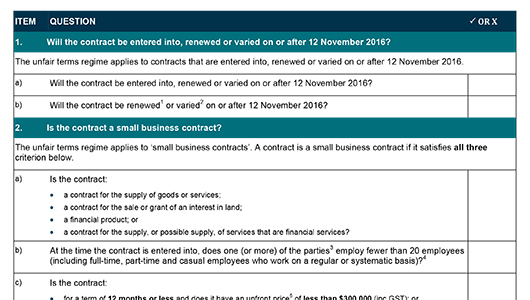From 12 November 2016, small businesses will be protected by the unfair contract terms regime under the Australian Securities and Investments Commission Act 2001 (Cth) and the Competition and Consumer Act 2010 (Cth).
Unfair contract terms regime
From 12 November 2016, small businesses will be protected by the unfair contract terms regime under the Australian Securities and Investments Commission Act 2001 (Cth) and the Competition and Consumer Act 2010 (Cth). Under this regime, a court may declare any ‘unfair term’ in a ‘small business contract’ to be void and unenforceable.
The checklist below is designed to assist you in reviewing your standard form contracts to determine whether the regime is likely to affect any of the terms in those contracts. It also provides recommendations on what you can consider doing if you identify a term that may be ‘unfair’ under the new regime.
Please note that the information provided in this document is of a general nature only and does not cover all aspects or nuances of the unfair terms regime. As a result, it should not be used as a substitute for legal advice. Please let us know if you have a specific legal question about the application of the new regime.
For further information on the background of the new unfair terms regime, please consult the Explanatory Memorandum for the bill, which can be accessed here.
Unfair contract terms checklist

Download a copy of the full checklist.
What are the consequences of using an unfair term?
There are currently no direct financial penalties for merely including an unfair term in a small business contract.
However, if a court (on an application from a counterparty or a regulator) finds that a terms is unfair, then it may grant a declaration that the term is void and unenforceable. This means the unfair term will be treated as if it did not exist. The court may even declare that the entire contract is void if it cannot remain in force without the unfair term. Regardless of the outcome, this process could be costly and time consuming for a party seeking to rely on the allegedly unfair term.
In addition, if a party seeks to enforce a term after it has been declared void, then it may be ordered by a court to pay compensation to the counterparty. A business could also suffer damage to its reputation if it is found to have included unfair terms in its standard form contracts with small businesses.
What to do next
If there is a risk that a term in your standard form contracts may be classified as an unfair term, you should consider:
- amending or removing the term,
- tailoring or negotiating your contracts to suit the circumstances of the particular transaction,
- developing an alternative form of the contract for small businesses, or
- structuring procurements so the monetary and duration thresholds do not apply, ie. through umbrella agreements.
If you are using a standard form contract, you should also conduct some form of due diligence to determine whether any counterparty is likely to be a ‘small business’ which has the protection of the new regime.
Legal Notice
The contents of this publication are for reference purposes only and may not be current as at the date of accessing this publication. They do not constitute legal advice and should not be relied upon as such. Specific legal advice about your specific circumstances should always be sought separately before taking any action based on this publication.
© Herbert Smith Freehills 2024

